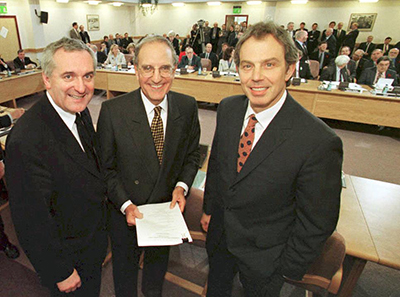👉 Find out about The Open University's History courses. 👈
 Previous British Prime Minister, Tony Blair, US Senator George J. Mitchell and former Taoiseach Bertie Ahern on April 10 1998 after the making of the Good Friday Agreement.
The Good Friday Agreement (or to some, the Belfast Agreement – more of that below!) changed my life.
Previous British Prime Minister, Tony Blair, US Senator George J. Mitchell and former Taoiseach Bertie Ahern on April 10 1998 after the making of the Good Friday Agreement.
The Good Friday Agreement (or to some, the Belfast Agreement – more of that below!) changed my life.
I was working in the voluntary sector as the Agreement loomed in the mid-nineties, watching political developments with huge interest. When it dawned on a few of us that if the politicians were to secure a deal by Easter 1998, the Talks Chair Senator George Mitchell’s famous deadline before he left for his new-born baby in the USA, then there would be an instant and massive campaign for the hearts and minds of voters.
A referendum had been promised way back in time by previous Prime Minister John Major MP in what was dubbed the ‘triple lock’ – the two governments, the ten political parties and then the people would each have to consent!
In today’s parlance, we created an overnight pop-up YES campaign – I can recall borrowing, then carrying in computers to an empty short-term office let, as the snow fell around us; we persuaded colleagues to take leave from their jobs and we hired unemployed volunteers on equal pay to create an instant hub. We set up a website (only because it seemed ‘sexy’ in those early days of digital).
The challenge was enormous – how to persuade upwards of a million voters to support a complex international treaty, crafted over two years, in 20,000 words of legal jargon, when almost everyone was ‘war-weary’, suspicious and fearful. The ‘Troubles’ as we rather quaintly termed them, were killing up to a hundred citizens a year, trust was at rock bottom, would there ever be an end to seemingly intractable conflict, people wondered?
Of course, there was a hope and confidence in a new dawn of peace, but so were there legitimate opponents and doubters – would the IRA really decommission their weapons? Would the prisoners who were to be released within two years, really resist a return to violence? Would the vague policing reforms, promised through what only later became the Patten Commission, disband or reform the Royal Ulster Constabulary, beloved of some, detested by others? Would power-sharing between Unionist and Nationalist actually work? Or would gridlock rule?
Campaigning was fierce, fired by emotion, pain of loss and aspirations for a better future.
The polls were erratic, at one stage showing only 37% in favour; after the ‘Balcombe Street gang’ (some of the longest-serving IRA prisoners named after a London hostage incident) was released early as a show of good faith to Irish Republicans, they were hailed by Sinn Féin leader Gerry Adams, as ‘our Mandelas’ which did not go down well with Unionists. The otherwise popular Labour Secretary of State for Northern Ireland, Mo Mowlam MP compounded the problem, as we viewed it, by releasing notorious UDA killer Michael Stone, as if these had ‘equal and opposite effects’ on Unionists and Nationalists. They didn’t – good upstanding Protestants wondered who had ‘given the keys of the asylum to the lunatics’, as it were. Polls plummeted.
Eventually, we clawed back the narrative, delivering impressive cross-party, cross-community platforms of realistic and authentic spokespeople, arguing to give peace a chance, through a victory to both ‘sides’ and lay the foundations for a better, more prosperous future, building on consent and strong expression of both North-South and East-West institutions.
It worked. 676,966 voted YES, with a huge 82% turnout, delivering a 2:1 triumph and an overwhelming mandate for progress.
It changed my life, because I then became a continuous supporter of the peace process through Stratagem the political consultancy I set up to deepen and broaden the political process and its new structures; little did I predict, however, that two decades on, we would be gridlocked by some of the very protections that were then necessary to persuade voters that the old days of discrimination were over. The ‘ugly scaffolding’ as Mark Durkan MLA dubbed it, had become an impediment to forward momentum.
Nor did I guess that around the world our little Agreement (on whose name we could not even agree!) would be so magnetic for others in conflict; so we set up Stratagem International to feed this hunger for insights, intelligence and ideas about practical conflict resolution. The theory that those who have worked through conflict can best understand those still in conflict, offering insights and support, remains true to this day.
That is why I remain an enthusiast for peaceful, democratic progress in Baghdad, Belfast, Bogota or Barcelona and utterly confident that we can overcome our temporary setbacks. After all, we cannot put the prisoners back, release the weapons, restore Articles 2 and 3 of the Irish Constitution and undo the police reforms, can we?

Rate and Review
Rate this article
Review this article
Log into OpenLearn to leave reviews and join in the conversation.
Article reviews